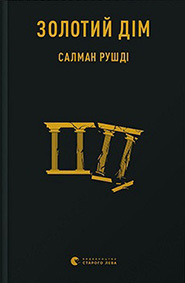Take a photo of a barcode or cover
challenging
dark
emotional
informative
mysterious
reflective
tense
medium-paced
Plot or Character Driven:
A mix
Strong character development:
Yes
Loveable characters:
Complicated
Diverse cast of characters:
Yes
Flaws of characters a main focus:
Complicated
“A moralidade veio antes da religião, e a religião foi a forma que os nossos antepassados encontraram de responder a essa necessidade inerente. E se fosse assim, então seria perfeitamente possível levar uma vida boa, ter um forte senso de certo e errado, sem nunca deixar Deus e suas harpias entrarem na sala.”
Gostei muito da narrativa do Salman, com certeza irei ler mais livros dele.
O livro tem muitas referências, até achei muitas delas ótimas, mas fica um pouco cansativo também, mesmo assim foi uma ótima leitura.
Gostei muito da narrativa do Salman, com certeza irei ler mais livros dele.
O livro tem muitas referências, até achei muitas delas ótimas, mas fica um pouco cansativo também, mesmo assim foi uma ótima leitura.
This is a solid read, a great story and a biting satire on current affairs that would have been infinitely improved if Rushdie had found a better Point of View delivery than his unctuous asshole narrator who sounds exactly like he wandered in from one of the Jonathans' (Lethem/Franzen) worst novels to namedrop compulsively, bloviate about his own excellent taste, smoke magical herb and objectify women.
Absolutely filled to the brim with references and tangents. Rushdie is talented but it wasn’t for me. Read as more of a book on Rene’s every exhausting thought and opinions as opposed to really anything about the Goldens.
challenging
dark
reflective
tense
medium-paced
Plot or Character Driven:
Plot
Strong character development:
Yes
Loveable characters:
Complicated
Diverse cast of characters:
Yes
Flaws of characters a main focus:
Yes
I had a hard time with the slow start of this book. I’m going to try to finish it some other time.
"...I learned the final lesson, the learning of which separates us from innocence. That there was no safe space, that the monster was always at the gates, and a little of the monster was within us too, we were the monsters we had always feared, and no matter what beauty enfolded us, no matter how lucky we were in life or money or family or talent or love, at the end of the road, the fire was burning, and would consume us all."
Rushdie's prose is dense and lovely, but I didn't find any of the characters or the story itself compelling.
**I received this book as a Goodreads First Read**
Rushdie's prose is dense and lovely, but I didn't find any of the characters or the story itself compelling.
**I received this book as a Goodreads First Read**
emotional
medium-paced
Picked this up because I went to see Rushdie do a reading from it. He's very charming in person. This book however is less charming. Rushdie is too good to write a bad book, but this story of rich people trying to transform themselves into different rich people really didn't do anything for me. It was interesting to see Rushdie work out his thoughts about gender through a sympathetically portrayed trans character. He tries to get at a fundamental thematic question which he hits you over the head with: "Is it possible for a man to be a good man when he is also a bad man?" But like, shrug? Sure?
This book has a very interesting structure, it resembles a play, possibly a Greek tragedy. This way we can experience the story how it presents itself to the narrator, who first sees the Goldens arrive, and slowly gets more and more acquainted with them. Unfortunately this structure, which is very interesting from the intellectual point of view, prevented me from getting to know the character on my own, but forced me to fully rely the narrator (aka author), who told me right from the beginning, who is who. This introduction resembled an extended list of characters, to long for my taste. The characters themselves, though not entirely unbelievable, can be best described as symbols rather than people. The most alive people in the story were for me the narrator’s parents, who only come up now and then. I am wondering if the author thought about his own parents when he wrote this characters, because they seem to be the only ones he has a real warm connection to.
I won’t talk long about all the references to the very end of the end of the book (When we finally discovered…) og the intertextual references, which were really interesting when done with context, but for the most part were an irritating list of films I knew nothing about. There were just too many of both.
What I want to talk about is some themes that the book comments a lot on. They are important themes that everybody is talking about nowdays: autism, gender issues, the current political situation in the US. I understand that the author wanted to paint a picture of modern America, but it seems like he desperately tries to join the conversation and has nothing new to say.
Another thing is the culmination. After he has been baiting us for so long with the remarks that we will find out all in the end, the culmination we get is disappointing. He doesn’t lie, we do find out all, but we get what seems like a summary on the life of Nero Golden up to date, taken form any gangster fiim, you name it. And the big reveal, I got it already in the first third of the book.
That said, Rushdy is brilliant in writing about what he knows: the immigration, the longing for home, cultures, literature, a certain mood in the air. The book has a lot of atmospheric cinematographic descriptions and it can be easily dissected into expressive quotes. Sadly, these quotes don’t make a good novel.
These I only some points I wanted to touch upon, but I could have talked about it for a long time, which is too one of the upsides of this novel, and it can be highly recommended for a book club.
I won’t talk long about all the references to the very end of the end of the book (When we finally discovered…) og the intertextual references, which were really interesting when done with context, but for the most part were an irritating list of films I knew nothing about. There were just too many of both.
What I want to talk about is some themes that the book comments a lot on. They are important themes that everybody is talking about nowdays: autism, gender issues, the current political situation in the US. I understand that the author wanted to paint a picture of modern America, but it seems like he desperately tries to join the conversation and has nothing new to say.
Another thing is the culmination. After he has been baiting us for so long with the remarks that we will find out all in the end, the culmination we get is disappointing. He doesn’t lie, we do find out all, but we get what seems like a summary on the life of Nero Golden up to date, taken form any gangster fiim, you name it. And the big reveal, I got it already in the first third of the book.
That said, Rushdy is brilliant in writing about what he knows: the immigration, the longing for home, cultures, literature, a certain mood in the air. The book has a lot of atmospheric cinematographic descriptions and it can be easily dissected into expressive quotes. Sadly, these quotes don’t make a good novel.
These I only some points I wanted to touch upon, but I could have talked about it for a long time, which is too one of the upsides of this novel, and it can be highly recommended for a book club.





